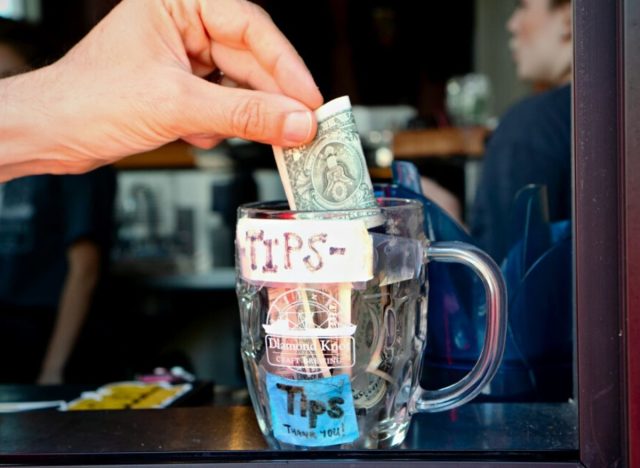Majority of Americans Believe Tipping Is Out of Control, New Survey Finds

If you’re getting increasingly fed up with the surge of tipping culture in restaurants and other industries, you’re far from alone.
Personal finance company WalletHub just released the results of a new survey where it had consumers weigh in on a range of questions regarding tipping. The poll found that nearly three in four Americans believe that tipping “has gotten out of control,” a statistic that only underscores a growing sentiment among consumers lately.
Though less common overseas, tipping has long been a ubiquitous part of the American dining experience. Many diners have made a habit of tipping servers 15% to 20% on their bills—as recommended by etiquette experts—when they enjoy a sit-down meal at a restaurant. However, the rise of technology in the restaurant industry has given eateries more opportunities to ask for tips, even in circumstances where customers feel tipping isn’t warranted.
For example, some restaurants have customers pay for their food at the counter through electronic screens that automatically prompt them to tip, even when those stores don’t offer sit-down service. Some fast-food chains, including Starbucks and Subway, also automatically give customers the option to tip when they’re placing app orders. Additionally, these types of tipping prompts have become more commonplace in non-restaurant businesses and services like ride-share apps and grocery store self-checkout kiosks.

Many consumers aren’t on board with the rise of tipping prompts at restaurants and elsewhere. The new WalletHub survey found that nearly three in five Americans believe businesses are trying to avoid paying employees better salaries by supplementing their total earnings with tips from customers. California is actively trying to address the low base wages restaurant workers earn with a new law that went into effect today, raising the minimum wage for most fast-food workers to $20 per hour.
Additionally, more than one in four Americans surveyed said they tip less when a screen prompts them to tip, and half of respondents said they often give tips because of social pressure rather than the quality of the service they received.
“For consumers, it has become exhausting that every time you check out somewhere, instead of just signing your name, there is a tip screen and then you have to ask yourself, do I have to tip this person and if I do, how much do I tip? Then there is the awkward moment where the employee notices you did not tip and you cringe a little inside,” Cortney Norris, Ph.D., an assistant professor at Oklahoma State University’s School of Hospitality and Tourism Management, told WalletHub. “I think the uncertainty of those two questions and the ensuing awkwardness are leading people to become irritated with tipping.”
Norris added that the growing tip fatigue among consumers could result in “negative outcomes” for workers who rely on tips as a source of income.
“For example, people just get fed up and stop tipping altogether, while those counter workers are still making the regular minimum wage, unlike full-service restaurant employees who do not,” Norris said.
However, another expert consulted by WalletHub had a different outlook on the rise of tipping opportunities.
“I do not agree that the tipping culture is out of control,” John Sobota—lecturer, recruiter, and program director at the University of Wisconsin-Stout—told the company. “With the use of electronic payment systems with auto-tip suggestions, I believe the tipping process has become much easier and hopefully, more profitable for servers. One still has a choice to either tip or not tip, or at the minimum decide how much to tip, based on the service provided.”









